This post may contain affiliate links. For more information, read my disclosure policy.
Knoepfle is the Swiss version of Spaetzle, an drop noodle made of an egg noodle dough. It’s our family tradition and they are the best holiday side dish recipe.
It’s kind of a labor of love but it’s worth every second!
I know, it’s a weird word: Knoepfle. Until 2011 I thought it was spelled k’niflea and then I googled and was astonished. You pronounce it the way I thought it was spelled: k – ni – flea. I’ve been eating these Swiss egg noodles my entire life and I just had to share the recipe with you.
Knoepfle is a type of egg noodle. Have you ever heard of Spaetzle? Spaetzle is the more popular form of this noodle. Spaetzle is a German egg noodle, but is (supposed to be) longer and thinner, somewhat like spaghetti. Knoepfle is the “button-shaped” equivalent to spaetzle. I equate it with Switzerland, because my dad is Swiss and we always explained it by calling knoepfle a “swiss noodle.” I think that Knoepfle originated in Germany and, from my research, I learned in Switzerland it is spelled Chnoepfli.
For me, knoepfle means two things: holidays and daddy.
Knoepfle is a special occasion food. It’s one of those things that is not entirely simple to make and it’s time consuming. We would eat it on Thanksgiving and Christmas, and maybe one other time of year when the stretch between Christmas and the next Thanksgiving got to be too long. My dad’s whole family makes it. I remember my Nana and Uncle preparing it when I was a child. But, really, I equate it with my dad, because no one makes it like him.
As a child celebrating Thanksgiving, I never new people ate mashed potatoes with their meal. We would have stuffing and knoepfle. It wasn’t until I was older that I realized mashed potatoes are a Thanksgiving staple. During the first year we were married I wasn’t even going to make potatoes until it dawned on me that my husbands’ family was attending our meal and would probably miss one of their traditions.
There are only 3 ingredients in the noodle recipe:
- Eggs
- Flour
- Milk
However, even with only three ingredients, it was time consuming to make. The mixing was done by hand, with a wooden spoon, and the dough was thick. You have to beat it until it’s a bit glassy looking and there are no lumps left, which would take several minutes. The time and arm strength made it a holiday-only dish…until my dad got himself a KitchenAid mixer. Now we eat knoepfle all year long!
Are you wondering how you get the little drop rounded shape of the noodle? When my dad was young the would do it by hand with two spatulas or a spatula and a knife and rake them into the boiling water one by one. You can see that huge bowl up there – the smallest amount we ever make – and can imagine how long that took!
When my nana visited Switzerland in the 1950s, she brought back the best invention ever: a knoepfle machine.
Basically, it’s a flat sheet of metal with holes and a cup that you can put the dough in to run it over the holes.
That’s one of the original in the family (my dad, my uncle, my aunt, and my grandparents all had one). As people have passed away, they’ve handed down the machines so now some of the grandkids have them.
Don’t worry – you don’t have to go to Switzerland to get your own knoepfle machine: amazon has them. (Of course it does.)
Get your own Knoepfle (Spaetzle) machine here.
There are a few ways to serve your knoepfle:
- Plain (or with parmesan cheese) – which is the only way I eat it. (I’m picky.)
- With fried onions – that’s the way we traditionally serve it. While my dad makes the dough, my mom fries the onions and they’re mixed with the noodles as they come out of the pot.
- With onions and Swiss cheese – my grandparents used to mix them with onions, then coat them with Swiss cheese and bake it like a casserole until melty.
- With lots of gravy!
Regardless of how you serve them you have to use a lot of butter. A LOT!
I’ll always remember my mom melted an entire stick of butter in a pan while frying onions (2 large yellow ones). And if you’re making them plain, you have to add butter to the dish to stir them with or they’ll stick to each other.
Knoepfle is synonymous with lots and lots of butter. (Bonus if you use Challenge Butter – that’s literally the ONLY butter my family has used. EVER.)
Those are my parents. 🙂
If you’re going to make these knoepfle, know that they seem hard but they’re really not. Here are a few tips:
- The rule of thumb is equal parts eggs and flour, then milk to get to the right consistency.
- When adding milk and beating, pay attention in the video how thick the dough is. You don’t want it so thick it won’t go through the machine, but not so thin it runs through like spaghetti.
- For a small family dinner we’ll make the recipe as written: 4 eggs to 4 cups flour. More often, he does up to 6 or 8 eggs!
- Use a large pot, preferably with a strainer insert. It makes it easier.
- Remember to add butter to the cooked noodles and stir after each addition so they don’t stick.
- If you have leftover, they freeze well!
If you try these, be sure to take a photo and tag me on social using #crazyforcrust. I want to see!
I hope they become a family tradition, just like they are for us.
Want even more? Subscribe to Crazy for Crust to get new recipes and a newsletter delivered to your inbox. And stay in touch on Facebook, Pinterest, Twitter, and Instagram for all my latest updates.
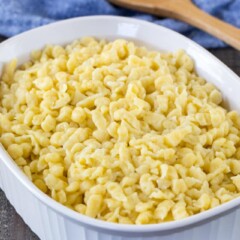
Knoepfle (Spaetzle)
Recipe Video
Ingredients
- 4 large eggs
- 4 cups all purpose flour
- 2 cups whole milk approximately
- 1 teaspoon salt
- 8 tablespoons butter
- 2 medium onions
Instructions
- Beat eggs and about 1 cup milk in an electric mixer fitted with the paddle attachment. Add 2 cups flour and mix for a minute, then add the remaining flour. The batter will be very thick. Add about 1 cup more milk and beat until glassy and thick. It's the right consistency when it takes 4-5 seconds to drip off a wooden spoon. If it's too thin, add some additional flour. If it's too thick to drip, add more milk.
- While you're mixing up the dough (or after, it's okay if the dough sits), chop your onions to small dice. Melt butter in a frying pan and cook the onions until translucent, but don't caramelize them. Set aside. (If you don't want to serve with onions, skip this step, but you'll still need the butter.)
- Meanwhile, begin boiling your water. It is best to use a large stock pot that has a nested colander. Once water is boiling, add approximately a cup of batter to the spaetzle press and slowly slide the press back and forth to create your knoepfle. Watch for the knoepfle to float to the top of the water, stir to get any that are stuck on the bottom to float, then boil for an additional one minute (after they are all floating). Strain and place into a large bowl. Bring water back up to a boil between batches.
- Once adding a batch to your serving bowl, add either some of the onions or 2 tablespoons of butter. Stir so they don't stick together.
- Serve with the sauted onions, extra butter, gravy, and Swiss or parmesan cheese.
- These freeze well if you have leftovers.
Recipe Notes
Recipe Nutrition
**Did you make this recipe? Don’t forget to give it a star rating below!**
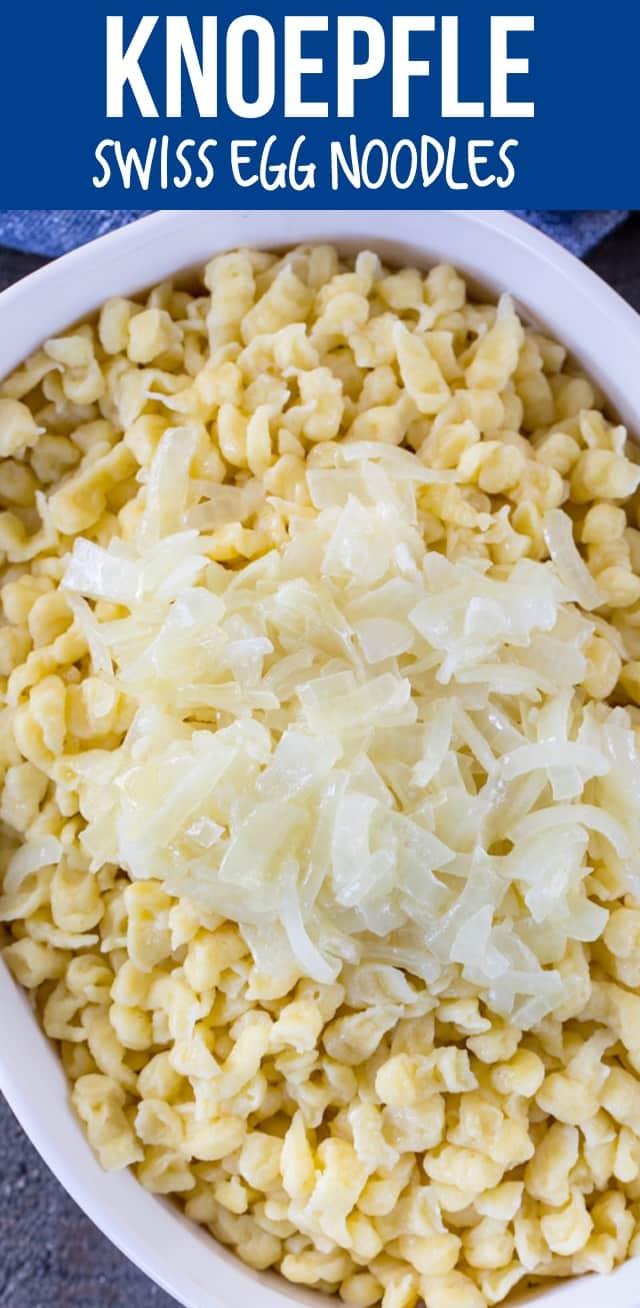
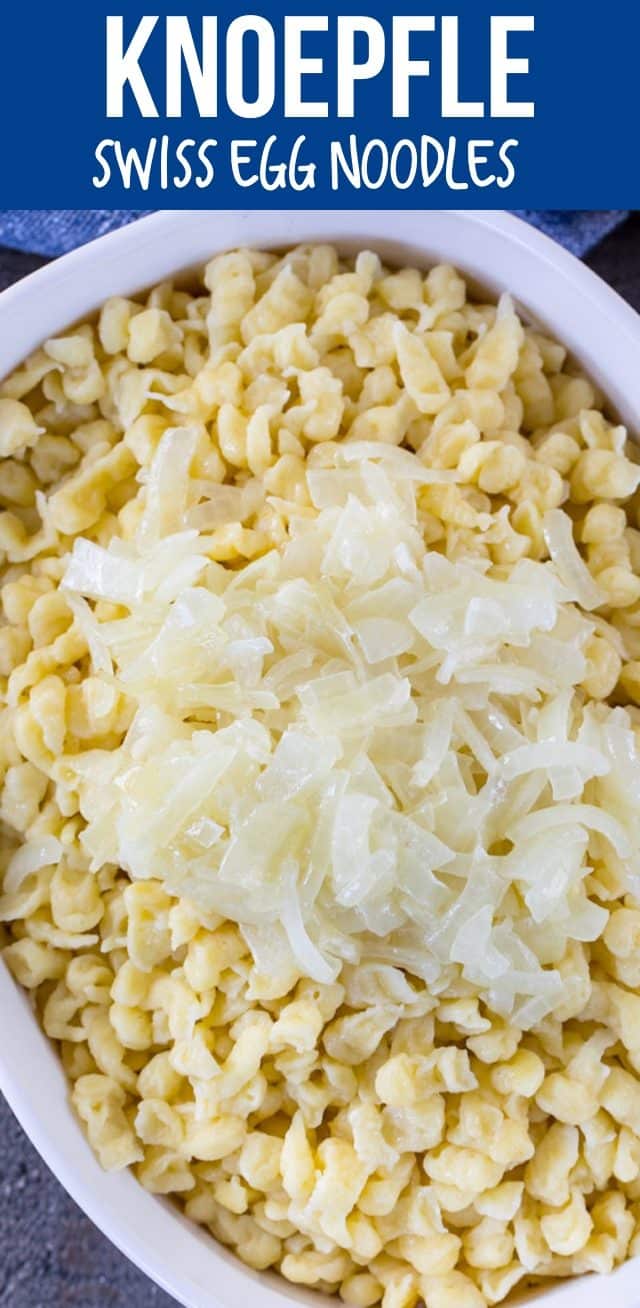
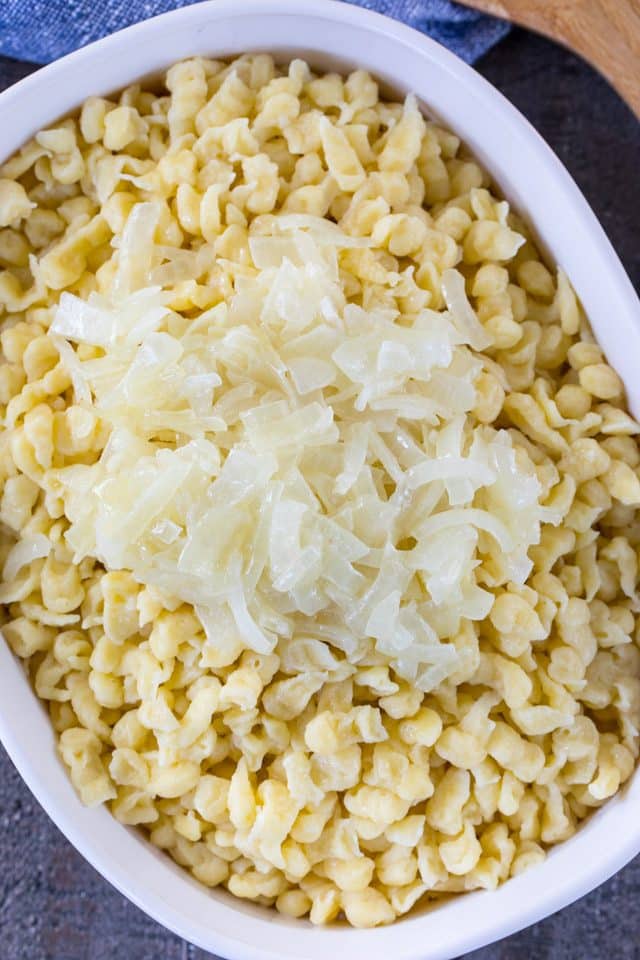
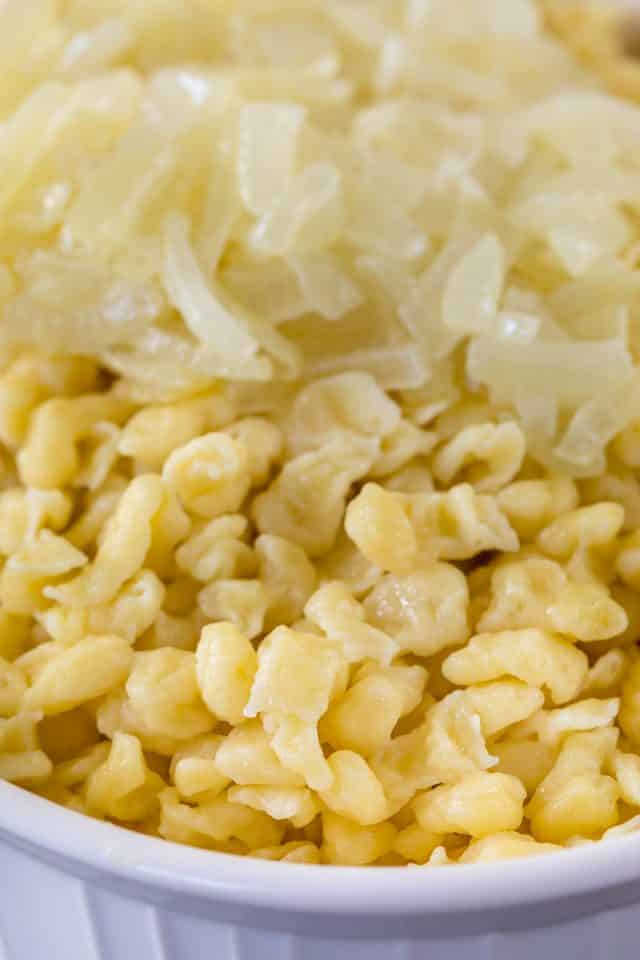
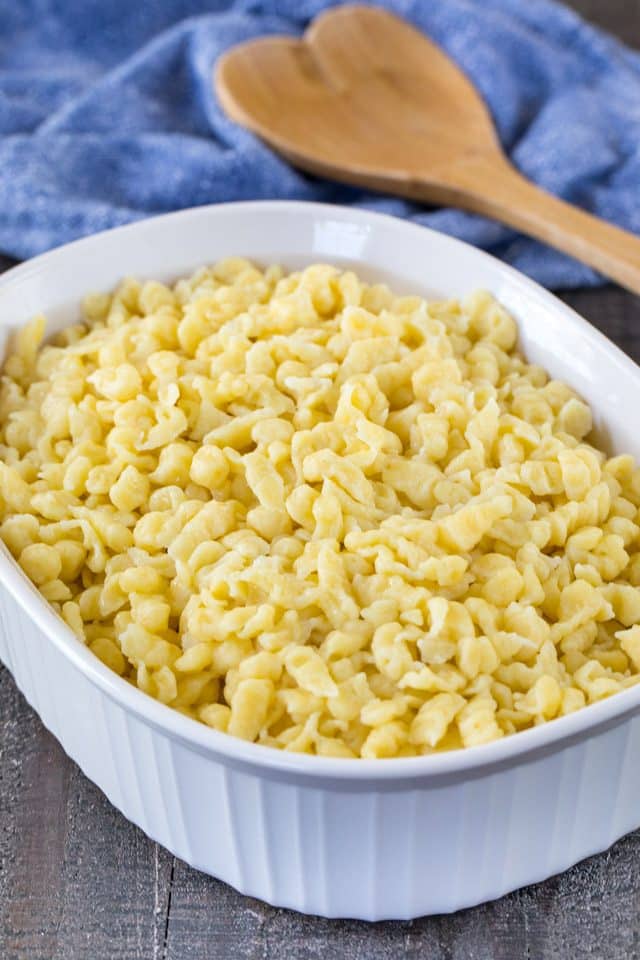
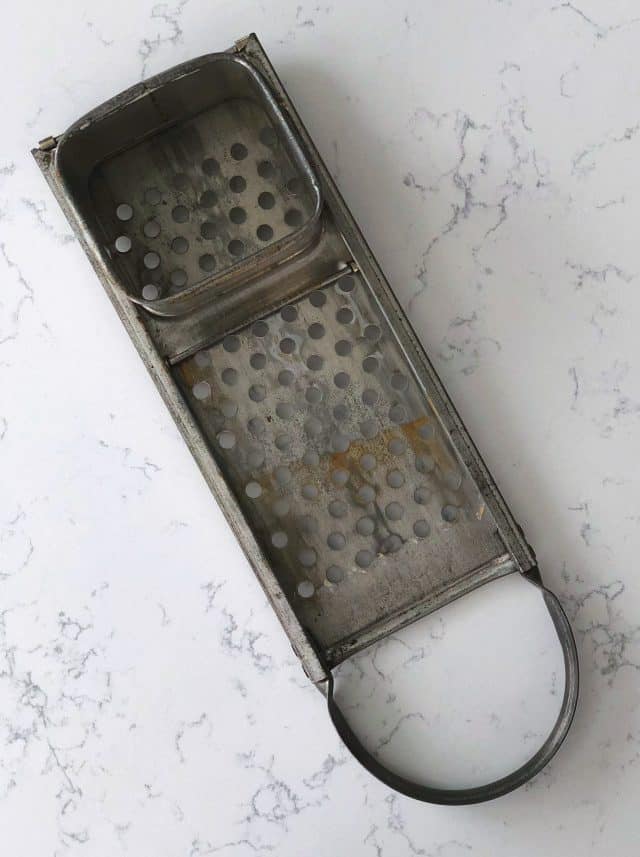
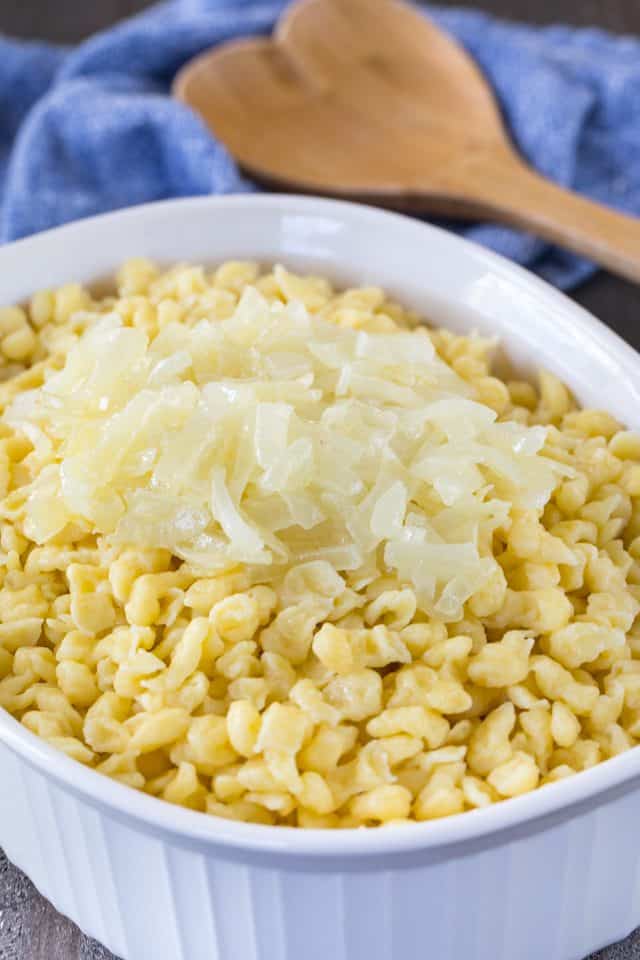

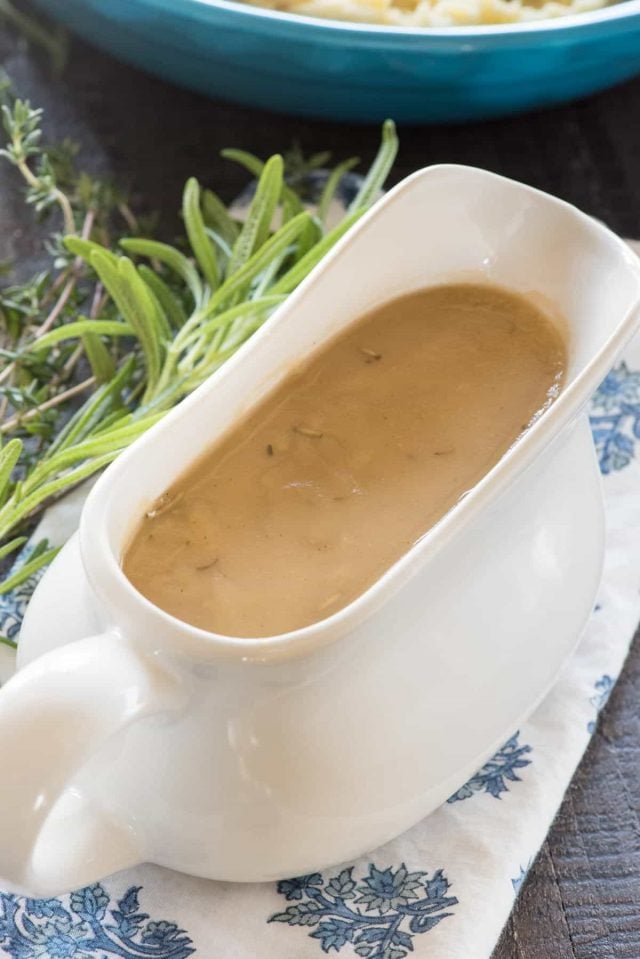
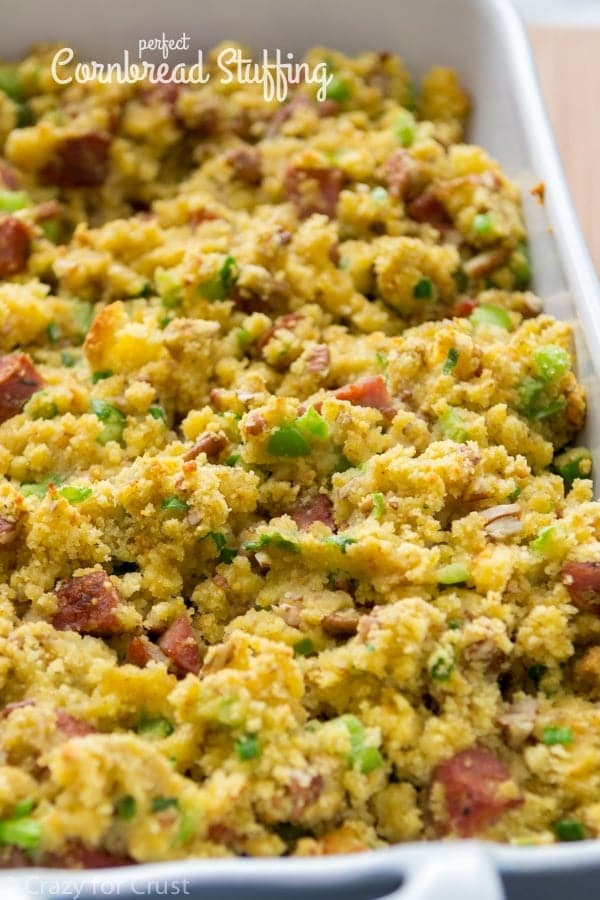
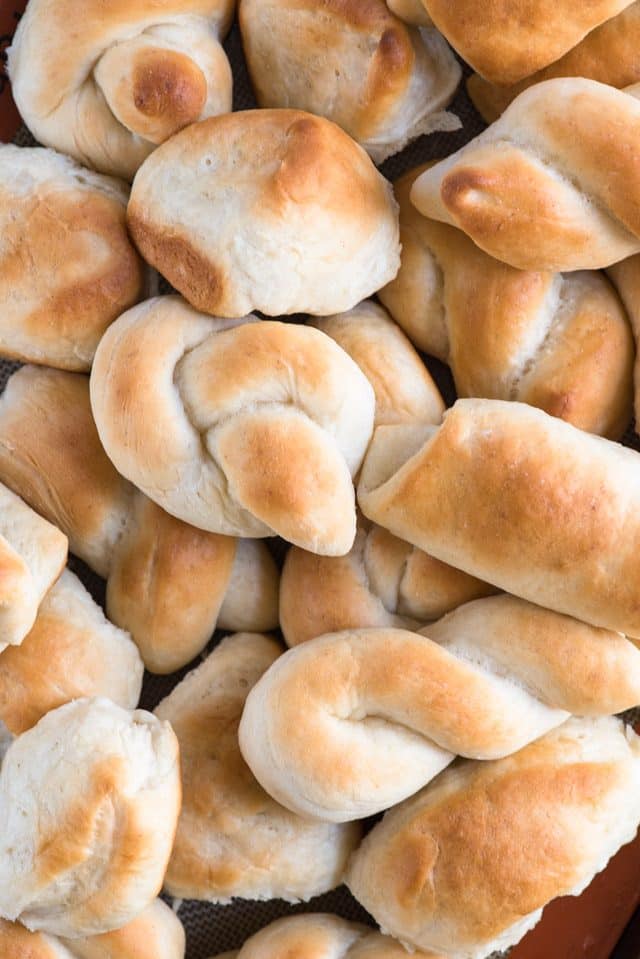
I don’t know if I’m allowed to rate this twice, but I did. Just want to say this has become a new holiday tradition on our table, even though I’m not German/Swiss. Wife is half German though, so that gives me some license!
This will be 3rd Thanksgiving/Christmas this wonderful recipe will grace our table, complete with the onions and Swiss cheese. Has been an enormous hit, and a great gravy companion! Thank you again for sharing your family tradition!
I am so glad you liked it!!
I have been looking for this recipe for YEARS! I never knew my maternal great grandmother from my mom’s father’s side. My mom always said she thought her grandmother was of Swiss decent
My mom, for as long as I could remember, would make these very simple dumpling that had no recipe and she couldn’t spell it. She called them “gunneflas” and they were made with eggs, a egg shell full of milk per egg, and enough flour to get the right drop consistency. The batter was dropped into boiling chicken broth by spoonfuls and covered to cook, stirring and scraping the bottom of the pot once before bringing to a boil again then scooping the dumplings out of the broth and dropping in another round of dumplings. It is time consuming! You can’t leave the pot unattended or it will boil over. They are so simple and are my go-to food when I’m not feeling well. I don’t know how my great grandmother cooked them, but this is what she taught my mother, who taught it to me, and now I’m teaching my teen daughter. It’s a family thing, one of two recipes I remember my mom making that she said came from that grandmother. They were never written down! Know I’m on a quest for the pancake recipe from this great grandmother’s kitchen… The whole family talks about them and my daughter and I are the only ones left who know how to make them. My grandfather was born on the family’s dairy farm where they had a store in the Chicago-area long before the suburbs exploded. They must have had plenty of these ingredients on hand all the time. Thank you for sharing this! It’s been a nice little reconnection to family memories and a bit of our history.
I am so glad this brought back memories!! I love how amazing food is at doing that.
Just like the ones I had growing up. Finally a way of explaining it that makes sense AND turns out well. I just have them with gravy, butter, salt and pepper. It’s my favorite side to any type of roast.
Thanks for the info! We had knoepfle every Christmas n Thanksgiving growing up. Slightly different as we were taught to use store egg noodles. Then we layered swiss,butter, s&p, noodles. Onions on top.No one around here has heard of or makes this. Good to know the history. We still make it so now I want to try the traditional way! Thanks again.
Dear Dorothy, about to make the knoepfle, recipe calls for a teaspoon of salt, but recipe does not say where it goes. I assume you put in in the flour?
Sorry about that, yes put it in with the flour.
Your recipe came out great! I am making it again today as a side for Thanksgiving dinner. Only problem I had was I added the full amount of milk all at once during 2nd addition of milk, and had to keep adding flour to get right consistency. Video was very helpful seeing what that should be. This time I will add milk until I get to the right spot, then stop.
Featured In
Rate This Recipe
Recipe Ratings without Comment